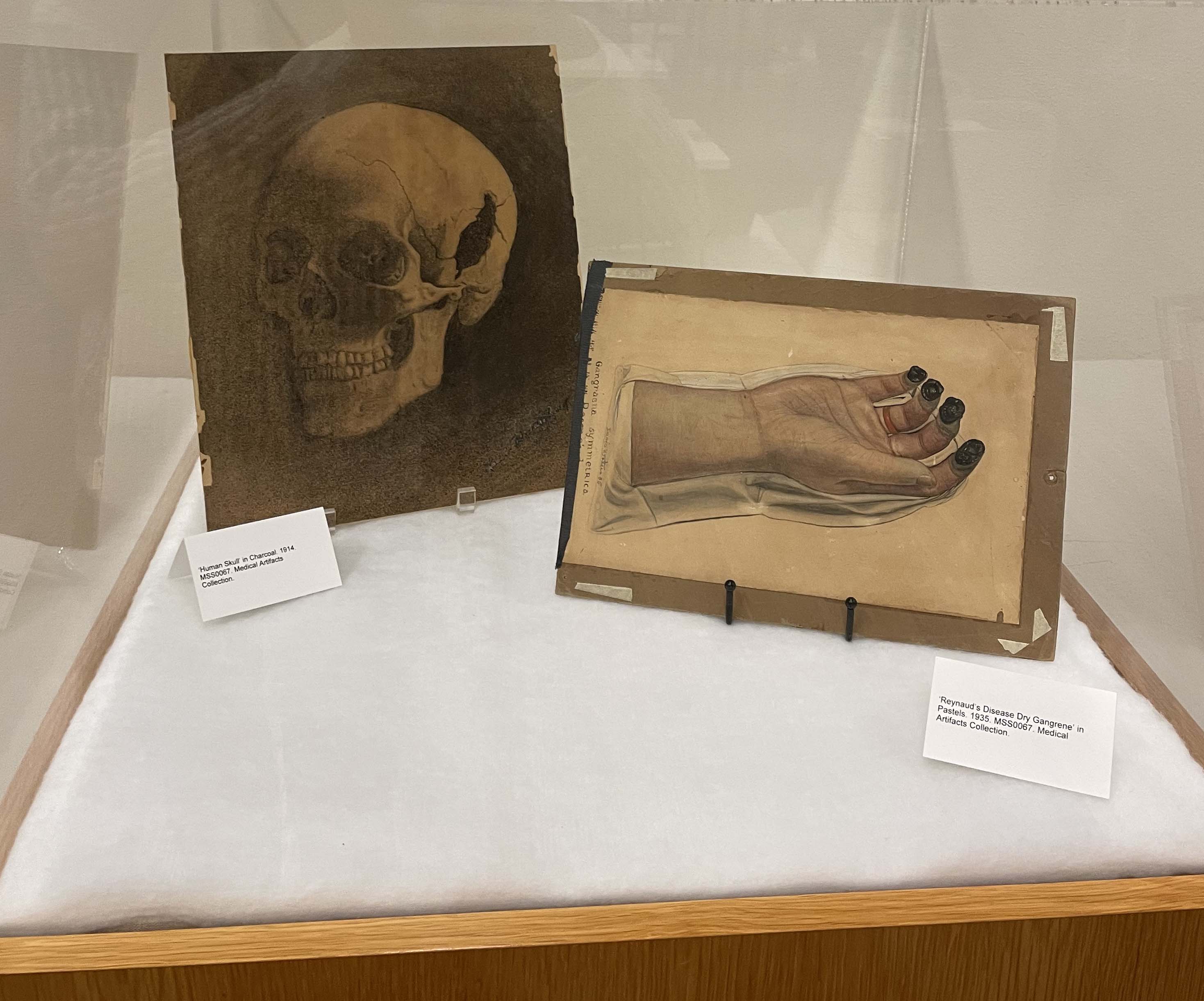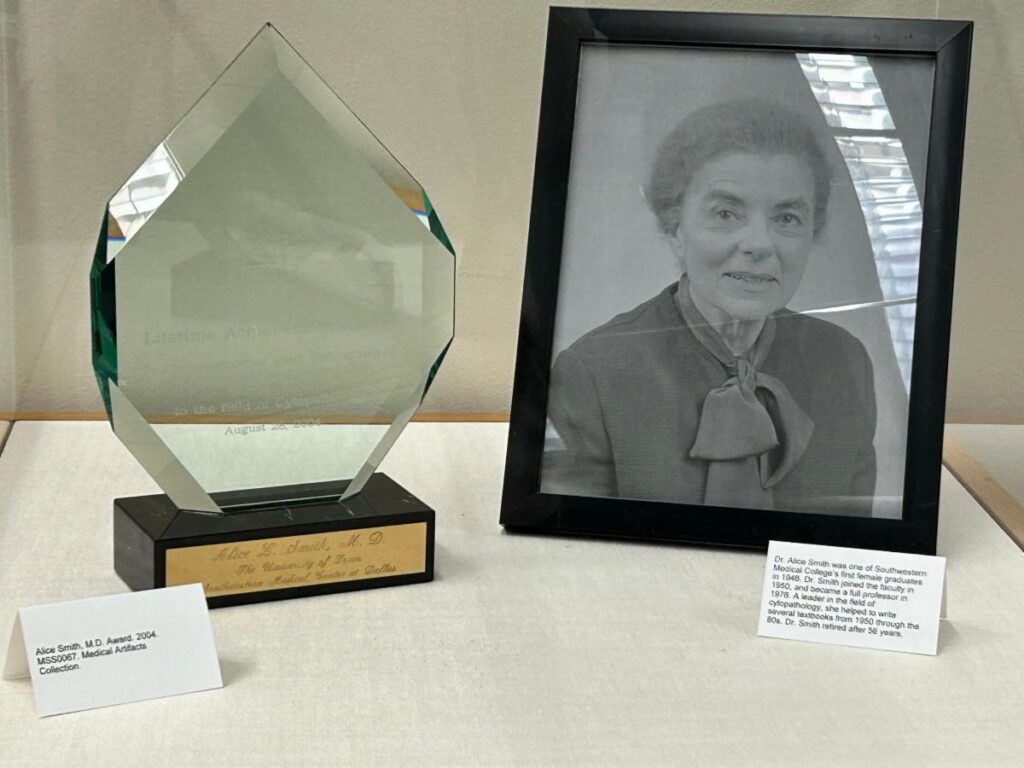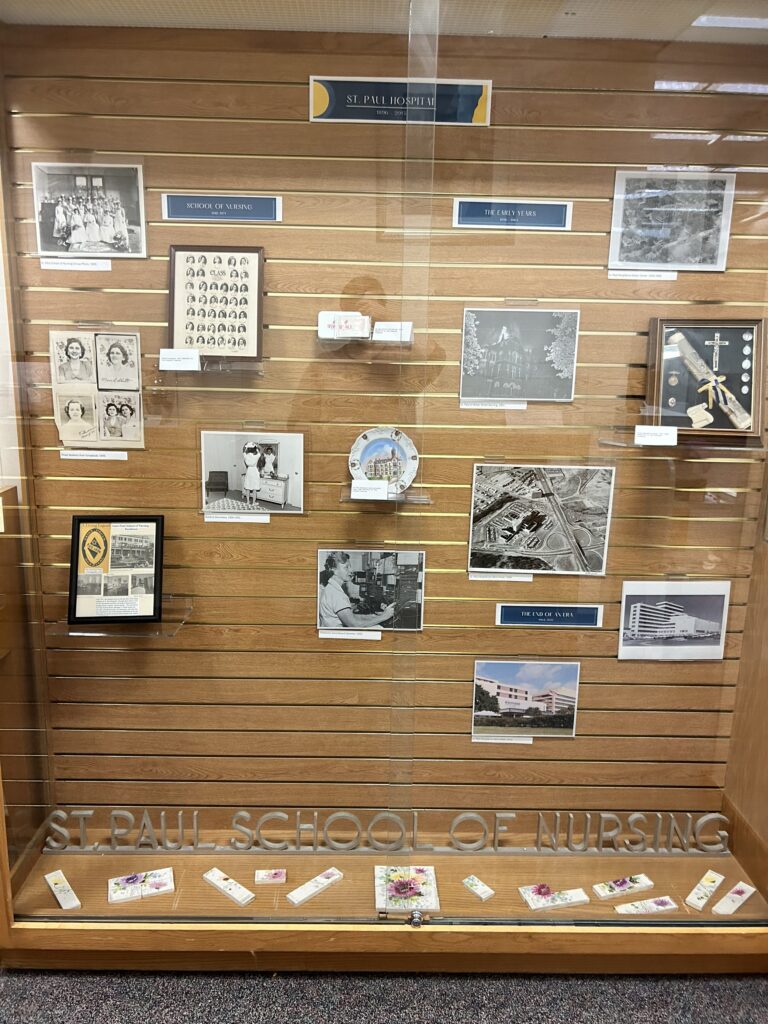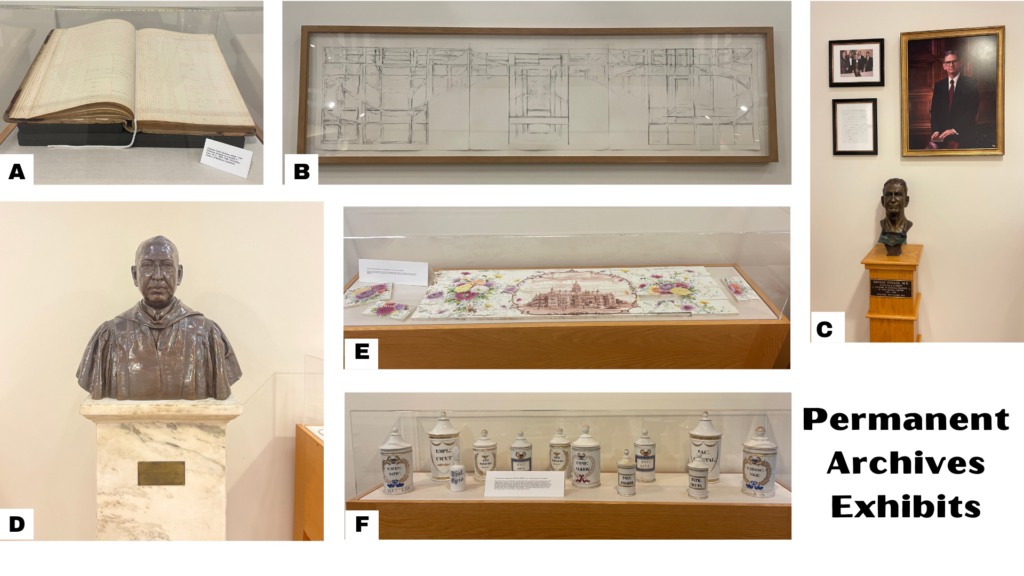The UT Southwestern Archives goes to great lengths to create sustainability when we deaccession or weed items from our collections. We consider what the item is and then determine the best action of recycling for it. With the help of the Sustainability Coordinator, we identified a company willing to recycle not only VHS, Betamax, and U-Matic tapes but also audiocassettes, DVDs, and Blu-Ray discs: this means that we do not send pounds of plastic to the landfill after the materials have been digitized. Additionally, we either donate the books we weed or work to properly recycle the ones that cannot be donated. These are just some of the efforts we make to preserve our planet.
Category Archives: Archives
New antique medicine display at Outpatient Clinic
At the beginning of each year, staff in the Special Collections Library & Archives exchange the items on display in the Outpatient Building on West Campus, and our newest exhibit features selections of antique medicine cases and medicines from our Medical Artifacts Collection. Several pieces were previously displayed in the main library, but by moving these items to the Outpatient Building, we are able to share the archives with more of our campus community.
New illustration exhibit in the Library
The Library’s exhibit space now features a selection of books, illustrations, and art focused on medicine and doctors. The works span two centuries and come from several of the archive’s collections, including the History of Medicine Collection, the Biomedical Communications Collection, and the Medical Artifacts Collection. The pieces on display are not only reference works; some also capture the public’s view of doctors and the field of medicine, contemporary to the time they were created.
The pieces meant for training include human figures from France in the 19th century, oil painting and charcoal works by our own Lewis Waters that capture human anatomy, and depictions of surgical procedures. There are also hand-drawn illustrations from local news cartoonists of the 1940s through the 1960s, prints from French caricature artists, and prints from Vanity Fair’s series on the important men and women of science.

Take an Archives tour!
| Ever wondered how archival items are stored? Want to look at a book from the 1500s? Simply want to learn more about the university’s history? All three are great reasons to take a tour of the archives (including the rare book room), which are available by appointment with staff in the Special Collections Library and University Archives. The archivists can even pull specific items that you’d like to view ahead of the tour, so they are ready when you arrive. To request a tour or learn more, email archives@utsouthwestern.edu. |
Answers to October 2024 Library and Archives Trivia Contest
Out of the 423 entries received, we had one perfect score! Congratulations Ishrat Durdana! We had a tie for runner-up, Teri Lipscomb and Austin Matheis both only missed one. Thanks to all who participated!
- The UT Southwestern Library was founded in 1943.
- Southwestern Medical College was started by Dr. Edward H. Cary.
- The UT Southwestern Library’s Website can be accessed by all of the above. (Services Tab, Education & Training Tab on UTSW website, UTSW Clinical Portal, Google search by name)
- You can get help from all of the above. (Ask Us link, Library FAQs section, and In Person Library assistance M-F, 9AM-4PM)
- There are 9 librarians on staff at the UT Southwestern Library.
- The services offered by the library were all of the above. (Interlibrary Loan, exam proctoring, classroom reservations, and on-campus print services)
- The oldest book in the Archives was published in the 16th Century.
- There were 1733 article requests for our Interlibrary Loan Unit that were filled in FY2024.
- The temperature setting of the archives is 63 degrees Fahrenheit.
- Our ILL Unit borrowed 485 items from other institutions for our patrons in FY 2024.
- Our library ILL services invoices can be paid by all of the above methods. (Check, Interdepartmental Request, and Credit Card)
- We had 1436 document delivery requests filled for patrons in FY 2024.
- Writing a Literature Review is the most popular Library class.
- In FY24, the Library had 920,437 books in all formats(e.g., print, electronic, audiovisual, etc.).
- As an author, I can create profiles to manage my publications and scholarly activities in all of the above. (My Bibliography, ORCID, Scopus, and Web of Science)
- Violet Baird began the Archives for the University.
- The Library’s most popular point-of-care resource is UpToDate.
- The Library subscribes to all of the above USMLE and Board Preparation resources (BoardVitals, StatPearls, and USMLE First Aid).
- All of the above were new additions to the Library this year (Privacy Pods, Acoustic Tiles, New Carpet, and New Patterson Exhibit Space).
- The Library’s most popular subject guide in FY24 was the Artificial Intelligence (AI) Guide.
#WhoAmIWednesday with the UTSW Archives
The UTSW Special Collections Library and Archives asks for your help in identifying faculty, staff, students, residents, and more in photographs for which we have no names.
Each week (Wednesdays at 10 a.m.), we post an unknown person or group of people across our social media platforms. All you need to do is comment with the first and last name of the person. Once we have that information, we can properly identify them in the posted photo and any others that we have.
Our photos span the decades of the University’s history so please check back every Wednesday for a new unknown person and a chance to help us out.
Follow the UT Southwestern Archives on:
- Facebook – utswarchivesrarebooklib
- Instagram – @utswarchives
- X – @utswarchives
Archives spotlight: Alice Smith award on display
One of the Library’s exhibit cases this semester features Alice Lorraine Smith, M.D. (1920-2014). She was one of the first female students at Southwestern Medical College, and she graduated in 1946, which was just three years before the College merged with the University of Texas System.
Dr. Smith joined the UT Southwestern faculty in 1950 as an assistant professor and worked her way to full professorship in 1976. A leader in cytopathology, she wrote several textbooks on the subject and received the award on display (pictured below) in recognition of her dedication to the field.
Dr. Smith retired from UT Southwestern in 2006.

Introducing the St. Paul Hospital Alcove
This section of the library is dedicated to the 118-year history of St. Paul Hospital. Originally named St. Paul Sanitarium, the institution started out on Bryan Street in east Dallas. First operating out of a small cottage in 1896, and opening its new hospital doors in 1898, the sanitarium was established by the Daughters of Charity with the intent to help maintain a base level of care for Dallas’ growing population. In 1900, St. Paul’s School of Nursing was opened on the hospital grounds. Early on, sisters would visit patients in their own homes and bring items like food and clothing, in addition to medicine, to improve their overall quality of life. Free clinics were later opened as extensions of the hospital in other neighborhoods in Dallas. These clinics continued the work started by the sisters, providing food and clothing to those in need in addition to routine medical care.
St. Paul Hospital was at the center of several historic events. The institution was a key defense during the 1918 influenza pandemic. Forty-five tents were erected on site to facilitate a larger reach of patient care, primarily of the sick soldiers from nearby Camp Dick. Later, the hospital was the first facility in Dallas to integrate their facility, admitting an African-American intern in 1953, and giving black doctors courtesy privileges as early as 1954. This was followed by the admission of black students to the School of Nursing in 1955, staffing of black physicians in 1956, and full de-segregation in 1959.
In 1963, a new facility was opened on Harry Hines Boulevard and all 112 patients were moved in only five hours. A feat that mirrored the great fire of 1951, when all 250 patients and employees present were evacuated from the old hospital successfully. The move to the new facility was in part due to the growing partnerships in the Medical District along Harry Hines, and at UT Southwestern Medical Center. After decades of growth and collaboration UTSW bought St. Paul Hospital in 2005, fully cementing St. Paul’s place as part of UTSW’s Medical Center. After all of their innovations and historic firsts, St. Paul Hospital ended it’s time in Dallas in 2014. That year patients and staff were transferred to the new William P. Clements Jr. University Hospital and in 2015, St. Paul University Hospital was demolished.

New Additions to the Library’s Permanent Exhibits
Next time you’re on South Campus, stop by the Library (E2.200) and view the Special Collection and Archives’ additions to the Library’s permanent exhibits. Depicted in the image below are:
(A) Disease Case Studies Ledger from Bellevue Hospital by Edward H. Cary, M.D. 1898-1899. MSS0032. History of Medicine Collection.
(B) Draft sketch for the David Novros fresco in Gooch Auditorium. MSS0067. Medical Artifacts Collection. – Note: This is one of Library’s newest additions, which came from the Dallas Museum of Art.
(C) Ernest Poulos, M.D., bust, portrait, and a group picture and letter from the dedication of the bust. MSS0068. Department of Surgery Collection. – Note: The bust was made in 1996, and the photo features the chief residents who were under Dr. Poulos in 1989.
(D) Edward H. Cary, M.D., bust. MSS0067. Medical Artifacts Collection. – Note: The bust was made in 1929 and presented to Dr. Cary by the Baylor University College of Medicine.
(E) Painted and glazed fireplace tiles. 1890. MSS0030. St. Paul Hospital Collection. – Note: When the hospital was built in the late 1890s, heat was provided by both radiators and fireplaces.
(F) Assorted ceramic apothecary jars. 1930-1959. MSS0077. Leon A. Harris Apothecary Jars Collection.

Answers to the October 2023 Library Quiz
- You can access the UT Southwestern Library’s Website from the Services Tab on MyUTSW site, Education & Training Tab on the UT Southwestern website, UT Southwestern Clinical Portal, and Google Search by name.
- The Library has 555,806 books in all formats in FY23(e.g., print, electronic, audiovisual, etc.).
- The most popular Library class is Writing a Literature Review.
- As an author, I can create profiles to manage my publications and scholarly activities in My Bibliography, ORCID, Scopus, and Web of Science.
- The Library’s most popular point-of-care tool is UpToDate.
- The Library subscribes to the following USMLE and Board Preparation resources: BoardVitals, StatPearls, and USMLE First Aid.
- The Library’s most popular subject guide is About the Library.
- Nine librarians staff the UT Southwestern Library.
- Interlibrary loan, exam proctoring, and classroom reservations services are offered by the Library.
- The Interlibrary Loan Unit filled 2285 article requests in 2022.
- The Interlibrary Loan Unit borrowed 684 items from other institutions for our patrons in 2022.
- There were 899 document delivery requests filled for patrons in 2022.
- Our library ILL services invoices can be paid by check, interdepartmental request, and credit card.
- The UT Southwestern Library was founded in 1943.
- The oldest book in the Archives was published in the 16th century.
- The temperature setting of the Archives in 63 degrees.
- Violet Baird began the Archives for the University.
- Dr. Edward H. Cary started Southwestern Medical College
Congratulations to our winner Katarina Yaros who received the top score!
